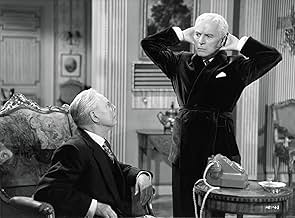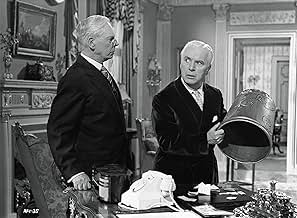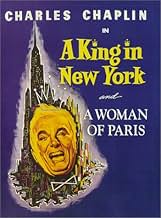IMDb-BEWERTUNG
7,0/10
9513
IHRE BEWERTUNG
Füge eine Handlung in deiner Sprache hinzuA recently-deposed European monarch seeks shelter in New York City, where he becomes an accidental television celebrity and is later wrongly accused of being a Communist.A recently-deposed European monarch seeks shelter in New York City, where he becomes an accidental television celebrity and is later wrongly accused of being a Communist.A recently-deposed European monarch seeks shelter in New York City, where he becomes an accidental television celebrity and is later wrongly accused of being a Communist.
- Auszeichnungen
- 1 Gewinn & 1 Nominierung insgesamt
Empfohlene Bewertungen
10Chuck-78
"A King in New York" is one of those few films that gets better and better every time you see it.
Yes, it's flawed--the sets look shabby, and some of the dialogue is stilted and melodramatic. Yet despite these shortcomings, AKINY still stands out as a wonderful, playful satire of 1950's America.
For those of you who may not know, Chaplin himself was targetted by the U.S. government at the time for his alleged communist leanings. In fact, AKINY had to be shot in Britain (Chaplin's birthplace) only because Chaplin and his family had been forbidden to re-enter the U.S after a short vacation overseas.
AKINY was Chaplin's response to the nonsense and paranoia that pervaded American society at that time. Chaplin also pokes fun at America's obsession with technology and the media--a point which is even more relevant today.
Chaplin plays King Shahdov, a deposed monarch who flees to America in the hopes of selling his plans for a peaceful, nuclear-based society (which never happens). Chaplin plays Shahdov as an honest, but hapless European monarch thrust into the dizzying whirl of modern America. Chaplin is at his absolute best here as a befuddled and somewhat puzzled outsider.
Shahdov soon meets up with two people. The first is Ann Kay (Dawn Addams), a beautiful young woman who seduces the King and lures him into appearing in her television commercials, and Rupert Macabee (played by Chaplin's son, Michael), a brilliant young boy whose parents have been imprisoned by HUAC. Also worth noting is Ambassador Jaume (Oliver Johnston), Shahdov's loyal friend and confidante. Johnston and Chaplin play off each other beautifully, and together they share some of the film's funniest moments.
AKINY is full of priceless "bits of business," as Chaplin used to say--there's a hilarious restaurant scene in which Chaplin mimes his order to the waiter in order to overcome the dreadful racket from the house band.
Then there's the scene in which Shahdov's newly lifted face become "unhinged" as he bursts into laughter at a comedy show. Chaplin slyly slips in and out of these bits (which are essentially silent comedy pantomimes dating back to his earliest days in English Music Halls) with great ease.
Such scenes provide the most satisfying moments in the film. Here, behind Chaplin's aged face and body, you can still see the little tramp come to life, and it's wonderful.
AKINY is vastly underrated by most critics who, for some reason, obsess over the sets, and virtually ignore what is truly one of Chaplin's masterpieces. AKINY is rarely screened in North America for some reason, so if you get the chance to see it, don't pass it up.
Yes, it's flawed--the sets look shabby, and some of the dialogue is stilted and melodramatic. Yet despite these shortcomings, AKINY still stands out as a wonderful, playful satire of 1950's America.
For those of you who may not know, Chaplin himself was targetted by the U.S. government at the time for his alleged communist leanings. In fact, AKINY had to be shot in Britain (Chaplin's birthplace) only because Chaplin and his family had been forbidden to re-enter the U.S after a short vacation overseas.
AKINY was Chaplin's response to the nonsense and paranoia that pervaded American society at that time. Chaplin also pokes fun at America's obsession with technology and the media--a point which is even more relevant today.
Chaplin plays King Shahdov, a deposed monarch who flees to America in the hopes of selling his plans for a peaceful, nuclear-based society (which never happens). Chaplin plays Shahdov as an honest, but hapless European monarch thrust into the dizzying whirl of modern America. Chaplin is at his absolute best here as a befuddled and somewhat puzzled outsider.
Shahdov soon meets up with two people. The first is Ann Kay (Dawn Addams), a beautiful young woman who seduces the King and lures him into appearing in her television commercials, and Rupert Macabee (played by Chaplin's son, Michael), a brilliant young boy whose parents have been imprisoned by HUAC. Also worth noting is Ambassador Jaume (Oliver Johnston), Shahdov's loyal friend and confidante. Johnston and Chaplin play off each other beautifully, and together they share some of the film's funniest moments.
AKINY is full of priceless "bits of business," as Chaplin used to say--there's a hilarious restaurant scene in which Chaplin mimes his order to the waiter in order to overcome the dreadful racket from the house band.
Then there's the scene in which Shahdov's newly lifted face become "unhinged" as he bursts into laughter at a comedy show. Chaplin slyly slips in and out of these bits (which are essentially silent comedy pantomimes dating back to his earliest days in English Music Halls) with great ease.
Such scenes provide the most satisfying moments in the film. Here, behind Chaplin's aged face and body, you can still see the little tramp come to life, and it's wonderful.
AKINY is vastly underrated by most critics who, for some reason, obsess over the sets, and virtually ignore what is truly one of Chaplin's masterpieces. AKINY is rarely screened in North America for some reason, so if you get the chance to see it, don't pass it up.
A great film that was neglected by the good old US of A when it was released in the late 50's. It was brandished as being to critical of the political atmosphere of the United States at the time. It's funny that Chaplin could manage to offend both Adolf Hitler (The Great Dictator) and the fascist-like/inspired 'anti-communist' movement of the 50's/early 60's U.S.A. There is actually a common link in those two movements (Naziism and the 50-60's 'anti-communist movement in the USA but I won't get into that here). Anyway, it is sad that this film is overlooked as it is one of Chaplin's best and should be looked as one in a career overview of this great filmmaker. Besides him, in the film there really is not any awe-inspiring actor/actress but Chaplin brings out the best in everyone and elevates them from eternal anonymity to something of recognition. His son Michael Chaplin for example is used quite wonderfully in this film. I later bought Michael Chaplin's late teenage memoir 'I Couldn't Smoke the Grass on my Father's Lawn' based on seeing him in this film and him impressing me so. It's too bad he could not develop more as an actor or recording star (he released a single in Britain in the mid-60's). I heartily recommend this film. See it and be open minded. Take a look at the way your country was run 50 years ago and ask yourself have things really changed this day in age when the 'communists' have know been replaced by the 'terrorists'.
Someone once described "A King in New York" as the worst film ever made by a major artist. I can think of many worse examples and while this late Chaplin picture may lack the genius of his earlier work, (it was his penultimate film; he made it several years after "Limelight" and before "A Countess from Hong Kong"), it is an often very funny satire on what Chaplin perceived as 'the modern age'. Driven out of America by McCarthyism, Chaplin constructed his New York in a British studio and typical of its writer, director, star and composer it makes no apology for its attack on right-wing politics, in particular the HUAC, as well as television, Cinemascope and plastic surgery. It's also less sentimental than it might have been, (always Chaplin's biggest fault), but the plot involving a child played by Chaplin's own son Michael, does the film no favours. On the other hand, Chaplin himself is superb and Dawn Adams is surprisingly good as a television star. No masterpiece, then but not quite the disaster some people have said of it either.
Now, I've yet to see A COUNTESS FROM HONG KONG, but out of Chaplin's full-length talkies, I didn't find A KING IN NEW YORK terrible by any stretch. In fact-- and I might lose cinephile points for admitting it-- I'd take this over the more prestigious LIMELIGHT any day! It's less self-indulgent and self-loving, and the satire of American media culture still mostly works.
Why does this get so much hate? Maybe it's the film's roughness. It's clearly set-bound and those sets do look cheap most of the time. But money can't buy inspiration, and I think this movie has more than enough inspiration to make up for its lesser production values. Many of the vignettes are delightful and the bittersweet edges (the subplot with Shadov's estranged queen, the character arc of the philosophical young boy) lend this film a great deal of memorability.
Why does this get so much hate? Maybe it's the film's roughness. It's clearly set-bound and those sets do look cheap most of the time. But money can't buy inspiration, and I think this movie has more than enough inspiration to make up for its lesser production values. Many of the vignettes are delightful and the bittersweet edges (the subplot with Shadov's estranged queen, the character arc of the philosophical young boy) lend this film a great deal of memorability.
Charlie Chaplin's A King in New York is a fine film to see when it's a laid-back afternoon and it comes on TV, as it's a bit of a surprise to come upon. It's a later Chaplin film, where he's no longer the iconic Tramp, yet in a way the logic of one of those films in terms of the society at large is still being toyed with. This time, instead of being on poverty row with holes in his shoes and a sweet and enduring love for a street girl, he plays a king whose country has gone to war and without many prospects financially comes to America to do commercials for products that he would surely rather not be pushing on the public. As life does imitate art (as far as the stereotype goes it does have a ring of constant truth), Chaplin at the time was an exile, kicked out of America for being a supposed communist, and with his non-prolific career going a little bit on the slide, he made the film as a quasi-light attack on American consumerism, of the vanity and stupidity that can come out of prosperity.
But at the same time, there is still the sensibility that Chaplin loves life and individuals, if not certain groups. This can be seen in the child character- one of Chaplin's own sons- who through his very intelligent but arrogant manner is one of the nicer and funniest characters in the film. While a lot of the humor, sometimes rather dry, is in seeing Chaplin's King and his assistant/butler talk of money problems and in the observations of the 'other', the best scenes come in showing what levels King Shadhov has to sink to in trying to pay his expensive hotel bills and stay afloat in a strange land. My favorite scenes where Shadhov's botched plastic surgery debacle, where it's funnier seeing the King trying not to laugh at a slapstick spectacle than the actual spectacle itself, and the scenes of the King trying to shill the items, often to the dissatisfied directors (I'm reminded of Lost in Translation, and in fact Chaplin's scenes are probably more successful than Coppola's).
Although the film is preachy at times- it's best when Chaplin goes for the more succinct jabs as opposed to the grandstanding, ironic since it worked perfectly at the end of the Great Dictator- the overall high-spirited and serenely theatrical direction makes this a worthwhile effort. Far from being the controversial film it got a reputation as following a non-release in the 50s in the US, it's only a cunning satire, with moments light and foreboding, and it deserves to be seen just as much as Chaplin's classics (if only by his fans, who might be apprehensive at the filmmaker making too many 'statements').
But at the same time, there is still the sensibility that Chaplin loves life and individuals, if not certain groups. This can be seen in the child character- one of Chaplin's own sons- who through his very intelligent but arrogant manner is one of the nicer and funniest characters in the film. While a lot of the humor, sometimes rather dry, is in seeing Chaplin's King and his assistant/butler talk of money problems and in the observations of the 'other', the best scenes come in showing what levels King Shadhov has to sink to in trying to pay his expensive hotel bills and stay afloat in a strange land. My favorite scenes where Shadhov's botched plastic surgery debacle, where it's funnier seeing the King trying not to laugh at a slapstick spectacle than the actual spectacle itself, and the scenes of the King trying to shill the items, often to the dissatisfied directors (I'm reminded of Lost in Translation, and in fact Chaplin's scenes are probably more successful than Coppola's).
Although the film is preachy at times- it's best when Chaplin goes for the more succinct jabs as opposed to the grandstanding, ironic since it worked perfectly at the end of the Great Dictator- the overall high-spirited and serenely theatrical direction makes this a worthwhile effort. Far from being the controversial film it got a reputation as following a non-release in the 50s in the US, it's only a cunning satire, with moments light and foreboding, and it deserves to be seen just as much as Chaplin's classics (if only by his fans, who might be apprehensive at the filmmaker making too many 'statements').
Wusstest du schon
- WissenswertesThe first film that Sir Charles Chaplin made in the UK after his exile from America, and his last leading role in a movie.
- PatzerDuring his diatribe, Rupert claims that the Roman Empire fell with the assassination of Caesar. Caesar's assassination occurred 17 years before the Roman Empire was established.
- Zitate
[after being told that the political turmoil in America is just a "passing phase."]
King Shahdov: Quite so. In the meantime, I'll sit it out in Europe.
- Alternative VersionenOriginal British prints run about five minutes longer than the version that was released in America in 1976. It is this American version that is available on video, but the British cut is available on disc.
- VerbindungenEdited into Geschichte(n) des Kinos: Fatale beauté (1994)
Top-Auswahl
Melde dich zum Bewerten an und greife auf die Watchlist für personalisierte Empfehlungen zu.
- How long is A King in New York?Powered by Alexa
Details
- Erscheinungsdatum
- Herkunftsländer
- Offizielle Standorte
- Sprache
- Auch bekannt als
- Un rey en Nueva York
- Drehorte
- Produktionsfirma
- Weitere beteiligte Unternehmen bei IMDbPro anzeigen
Box Office
- Weltweiter Bruttoertrag
- 910 $
- Laufzeit
- 1 Std. 50 Min.(110 min)
- Farbe
Zu dieser Seite beitragen
Bearbeitung vorschlagen oder fehlenden Inhalt hinzufügen



































